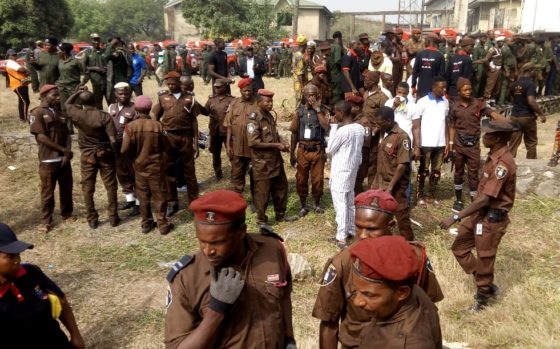
 By Rotimi Fasan
By Rotimi Fasan
IN the massive controversy that surrounded the inauguration of the Western Nigeria Security Network, otherwise called Amotekun or “Operation Amotekun”, the lone voice that was vehement in its opposition to the very idea of the security network has been the ruling elite from the far North, East and West.
While some of the spokespersons of the this elite currently in the government of President Muhammadu Buhari have tried in vain to cover their rhetoric of opposition in the veneer of legal argumentation, in other words, demanding that the activities of the security network be backed by law, others not in government have had less room to manoeuvre- nor do they care.
Abubakar Malami, the Attorney General and Minister of Justice, has been the arrowhead of the first tendency that sought to couch its opposition to Amotekun in legal argument. The other tendency, represented by the likes of Second Republic politicians, Junaid Muhammed and Balarabe Musa, are supposedly anti-Northern ruling elite figures whose apparent radicalism somehow manages to stay within the core mandate and interest of the Northern elite.
They see in Amotekun the spectre of Nigeria’s dismemberment as a federated unit. For them, the establishment of Amotekun is a subterfuge for the creation of an Oduduwa Republic that would bring together the Yoruba in a pre-military rule regional enclave.
While both the conservative and radical wings of the Northern ruling elite would appear to be holding different positions in their opposition to Amotekun, what is obvious to even a casual observer of the situation and follower of the controversy around the setting up of the regional security network, is the Northern elite’s opposition to any scheme that would appear to bring together Southern Nigerians or any part of the South as a united whole.
Itse Sagay, the Chair of the Presidential Advisory Committee Against Corruption and staunch supporter of President Buhari, made this point rather frontally in his intervention in the Amotekun controversy. I will not be surprised if Sagay, as some other Buhari stalwarts, soon becomes a target of both official and unofficial attack by members of the Northern ruling elite. This elite stood and still stands out in its opposition to Amotekun. This time, however, its usual trick of speaking from both sides of the mouth in its support of Nigeria’s peculiar federalism did not wash.
Other parts of Nigeria, from the Middle belt, to the South East and South-South were and are still united in voicing support for the idea of a federalised policing system. They were bold in their articulations having seen through the arrogant, self-serving insistence of a part of the country that wishes not just to equate itself with the whole but places itself above the other parts put together.
This time, it bears repeating, the modus operandi of the Northern ruling elite fell flat on its face. It simply did not work as the rest of the country could see the merits in the idea of a truly federalised policing network in the face of the glaring failure of the entire security network currently managed from Abuja.
Whatever are the details of the fine prints of the agreement between the six South West states governors and Abuja, what is important is the fact that Amotekun is taking off as planned by its initiators who now have the onerous task of ensuring its survival while guarding against its misuse or derailment by friends or foes from outside or within its sphere of operation.
That being said, the question of the Northern elite’s apparent unflinching support for the “unity” of Nigeria still needs to be closely examined. Is it the case that Nigerians from other parts of the country are less interested in the idea of a united Nigeria? What is it about our so-called federal system that the North finds so sacrosanct? Is there something in it that makes it appealing to the North than the rest of Nigerians?
In the immediate context of the debate around Amotekun, could the Northern elite’s opposition have been prompted by the unspoken fear that Amotekun is a metaphor for what happened under the rubric of a similarly-named scheme more than five decades ago? For many Northerners, that unfortunate event was a failed attempt by a section of the country to undermine Nigeria’s federalism or dismember the country after the attempt failed.
READ ALSO: Amotekun is a right step in right direction ―Arewa Youth leader
This year marks the fiftieth anniversary of the war that trailed the 1966 coup and the debate as to what really happened is still on. Nigerians must still remember that young members of the Nigerian Army, led by Major Chukwuma Kaduna Nzeogwu, in an early dawn broadcast on January 15, 1966 announced the end of Nigeria’s First Republic. For many historians of modern Nigeria, particularly chroniclers of the role of the military in the post-independence years, this was the trigger for the Civil War. That early morning exercise, Nigeria’s first military putsch, was codenamed “Operation Damisa”, damisa being the Hausa word for leopard or amotekun in Yoruba, the very name by which the South West governors’ regional security initiative is now known.
Metaphors carry undertones and evoke meanings well beyond what ordinary words portend. And while there has been nothing said by the Northern elite to suggest that Amotekun evokes the spectre of what transpired in the early hours of January 15, 1966, it is not impossible that the codename of the new community policing system that Nigerians seek to return to the polity inspires fear or at least worry in some quarters.
Whatever are these anxieties and whatever are the poetic overtones attached to it now, Amotekunseems a totally innocuous choice of name. It must be sheer serendipity that this name brings back echoes of our ill-fated First Republic. Whatever else may have been the outcome of “Operation Damisa” and the events that followed, leading to the Civil War, the ghost of which opponents of Amotekun evoke in a bid to illegalise it, whatever may be the outcome of the war, what cannot be denied is that it has given the Northern ruling elite, following decades of North-led military rule, an unfair advantage in determining the direction of Nigeria and the management and allocation of resources.
These are the advantages the Northern ruling elite, many times in cahoots with their counterparts from others parts of the country, often seeks to defend in its blind support of Nigeria’s untenable federal structure that is masked as patriotism. This it does even in its failure to cater to the needs of Northern masses whose unspeakable immiseration has led to revolts in the forms of banditry and insurgency that are in fact variants of a civil war. Let nobody speak of legality when what is at play is the protection and defence of unearned privilege.
The post Amotekun and fears of the Northern elite appeared first on Vanguard News.
https://ift.tt/38R6zgh by Nwafor via Vanguard News Albert Einstein Fools of Fortune
Comments
Post a Comment